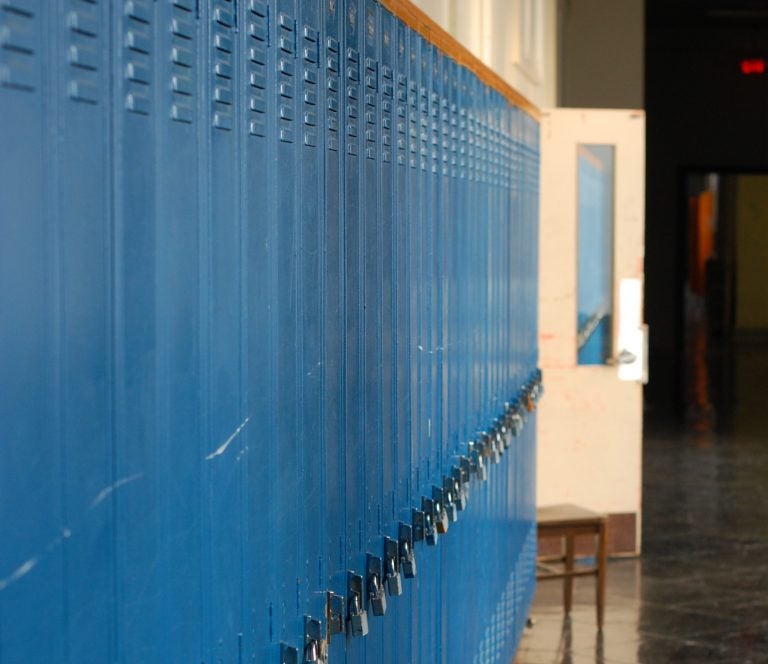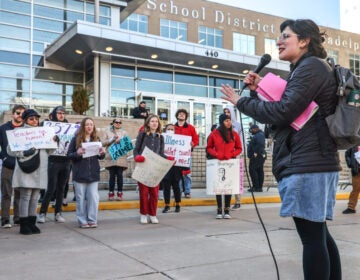Report: Philly schools lose more to corporate handouts than any other big city
Philly schools face an estimated $1B funding shortfall by 2022. A new national report found that the city is walking away from more school tax revenue than any of its peers.

An empty hallway at the old West Philadelphia High School (Ashley Hahn/PlanPhilly)
This story originally appeared on PlanPhilly.
—
Philadelphia schools face an estimated $1 billion funding shortfall by 2022, but a new national report found that the city is walking away from more school tax revenue than any of its peers.
Good Jobs First, a progressive think tank, authored a new report that compiled financial reports from 5,600 school districts across the United States to measure the impact of property tax abatements on public school funding.
Across Pennsylvania, 414 school districts reported nearly $98 million in deferred revenue linked to property tax abatements and other programs.
Dozens of towns and suburbs across the Commonwealth had carved out tax abatements to attract corporate tenants, subsidize farms or preserve open space. But nearly two-thirds of that statewide figure came from Philadelphia alone, where the local school district reported that the city’s sweeping property tax abatements has diverted $62 million from its education budget.
“In addition to Philadelphia being especially hard hit, Pennsylvania stood out as well,” said Good Jobs First executive director Greg LeRoy. “Pa. was the seventh hardest hit that we found.”
He said that the amount of funding lost to tax breaks could be even higher because the organization did not receive data from all of the state’s school districts.
Only the Hillsboro School District, in Oregon, listed more generous tax giveaways. The district, in suburban Washington County, hosts several major tech campuses, spanning companies like Intel and Salesforce, which have raked in local tax exemptions over the years.
But in Pennsylvania, local tax breaks take an unusually large toll. Most public schools are almost entirely dependent on property taxes and in this state, an unusually high portion of that funding – about 56 percent statewide – emanates from local governments, as opposed to the state or federal government.
“So, these local losses to abatements really hurt [Pennsylvania] school districts a lot,” LeRoy said.
The abatements reported by the Philadelphia School District include the Keystone Opportunity Zone program, which waive some state and local taxes for businesses. But the majority came from the city’s 10-year property tax abatement.
While both homeowners and real estate developers benefit from that program, LeRoy said it is, at heart, a giveaway of the city’s real estate industry.
“The residential property tax abatement does benefit developers that build the houses because it lets them charge somewhat higher prices than they would otherwise,” he said. “It also means that the incumbent homeowners, that is people not buying newly constructed homes and benefitting from the program, have to pay more because you still have to sustain public services.”
But Paul Levy, head of the Center City District, a nonprofit that represents Center City businesses and property owners, says Philadelphia might not have today’s booming downtown real estate market without the abatement.
“The report that was just published focuses on the revenue that has “been given away” by the city without asking the basic question: Would all of the development have happened without the abatement?”
LeRoy said that while it’s easy to see why cities start offering tax deals, many don’t know when to stop. Many other cities have seen downtown real estate heat up over the past decade, but in Philadelphia the windfall for property-tax-dependent schools won’t be realized for years to come.
“It’s a worthy goal that is trying to encourage more home construction, but the question is when does the city take its foot off the gas pedal,” LeRoy said. “You don’t want to have an open-ended incentive.”
Gene Barr, from the Pennsylvania Chamber of Commerce, says the statewide business community generally doesn’t like these deals either – unless they happen to be a company benefiting from the handout.
But the head of the state’s business lobby added that he regarded these programs as a necessary evil.
“[Abatements] shouldn’t replace comprehensive tax reform, but Pennsylvania has one of the highest corporate tax rates in the country,” he said. “As long as that’s true, and businesses have the opportunity to weigh one versus the other, you’re going to have these deals.”
And Barr said there would always be pressure to compete against other states and counties to lure big-ticket companies unless states and cities banded together and voluntarily banned bespoke abatement deals.
In the last year, Amazon triggered a national bidding war between cities vying to land the online retailer’s second headquarters. Philadelphia and Pittsburgh joined cities along the eastern seaboard offering billions in tax breaks in hopes of landing the tech giant’s promise of jobs and private investment.
“I’ve heard the argument that Amazon pitted cities against one another … but this is basic bargaining,” Barr said.
LeRoy said the biggest problem is that when mayors or other city officials negotiate new abatement deals like these, school administrators are typically cut out of the process, forced to sit back and watch as their future revenues shrink.
“These decisions are made by city or county officials even though the school district is the biggest loser,” he said.
WHYY is your source for fact-based, in-depth journalism and information. As a nonprofit organization, we rely on financial support from readers like you. Please give today.






